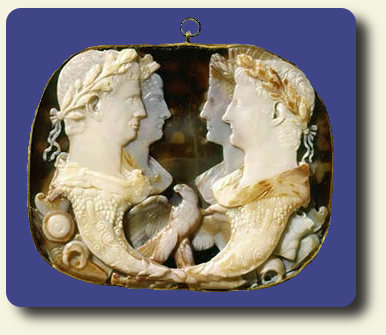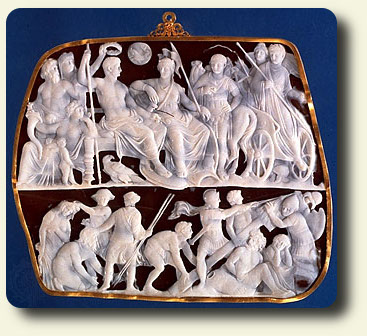
October 2010, Issue 9
Dollhouse Tourism
Page 25
Continue Dollhouse Tourism
 Italian miniature masterpieces can also be found in cameos.
Italian miniature masterpieces can also be found in cameos.
Cameos - the darling jewelry must-have of the Victorian era - are gems, hard stones, or shells that are carved in raised relief. Agate, onyx, sardonyx, and certain conchs are especially suited to this kind of work, as their layers of different colors make it possible to obtain pleasing contrasts. The technique employed is said to be like that of relief sculptures but in miniature. Ancient and Renaissance cameos were made from semi-precious gemstones, especially onyx and agate, in modern times, shell and glass are more common.
 The most popular cameos today are carved from sea shells, a tradition that began in the fifteenth or sixteenth century and was popularized as an accessory on any well-dressed woman by Queen Victoria of England.
The most popular cameos today are carved from sea shells, a tradition that began in the fifteenth or sixteenth century and was popularized as an accessory on any well-dressed woman by Queen Victoria of England.
The world center for shell cameo carving is Torre del Greco, found on the bay of Naples.
The shells from which cameos are produced come from the Bahamas as well as from select places in the Caribbean and the waters off East Africa. Different kinds of shells give birth to different colored cameos. For example, those carved in Cassis madagascariensis (commonly known as sardonyx shell) have a white design on a dark-brown background; those in Cypraecassis rufa (carnelian shell) exhibit lighter and darker shades of reddish-brown. The most valuable are those with the greatest color contrast.
The first step is to cut out the cup-the part of the shell that will be used-with a water-cooled cutting disc. The shapes of the cameos to be produced, usually oval or round, are marked on the inner surface of the cup, which is then roughly cut into smaller polygonal pieces.
Copyright© 2010
Custom Dolls, Houses & Miniatures / CDHM







